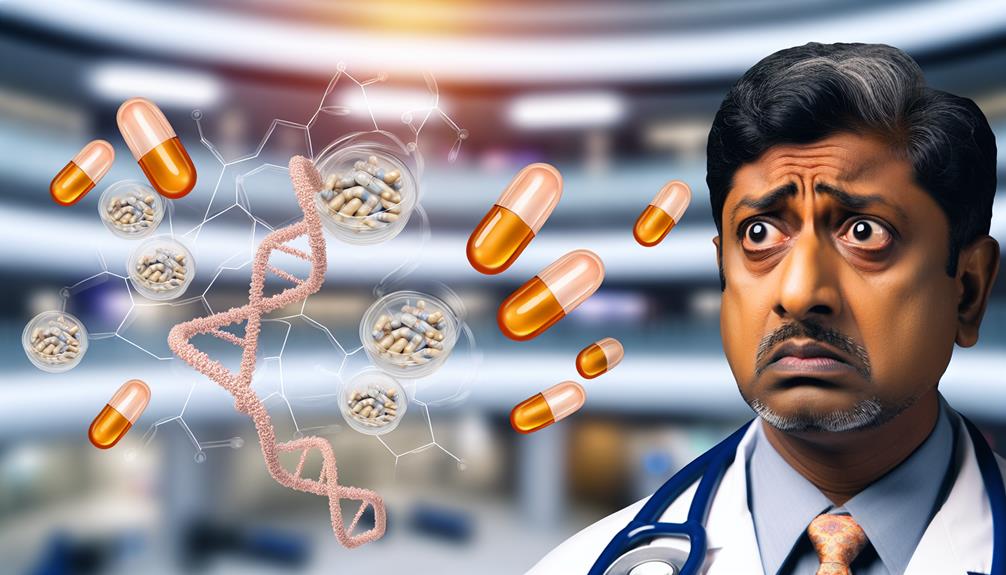Hormonal imbalance in men can arise from various causes. Poor dietary choices, particularly deficiencies in essential nutrients like zinc and vitamin D, play a significant role. A sedentary lifestyle further exacerbates the issue by reducing testosterone production. Psychological factors, such as stress and sleep deprivation, can elevate cortisol levels, disrupting hormone balance. Additionally, underlying medical conditions, excessive alcohol consumption, environmental toxins, and certain medications may also contribute. Each factor uniquely impacts hormonal health, leading to symptoms like fatigue and decreased libido. If these concerns resonate with you, there's much more to explore about maintaining hormonal balance effectively.
Poor Diet Choices

When it comes to hormonal balance in men, poor diet choices play a substantial role that can't be overlooked. I've observed that many men often underestimate the impact of their nutritional habits on hormonal health. A diet lacking in essential nutrients can lead to deficiencies that directly affect hormone production and regulation. For example, inadequate intake of vitamins and minerals such as zinc, vitamin D, and omega-3 fatty acids can hinder testosterone synthesis, which is vital for various bodily functions.
Moreover, the relationship between diet and glycemic control is essential. Consuming high amounts of refined carbohydrates and sugars can cause spikes in blood glucose levels, leading to insulin resistance over time. This condition not only affects overall metabolic health but can also disrupt the delicate hormonal balance. Elevated insulin levels can suppress testosterone production, contributing to a further decline in hormonal health.
In my practice, I often emphasize the importance of a balanced diet rich in whole foods, including lean proteins, healthy fats, and plenty of fruits and vegetables. These foods support ideal nutrient intake and help maintain stable blood sugar levels, promoting better glycemic control. By addressing nutrient deficiencies and making informed dietary choices, men can greatly improve their hormonal balance and overall health. It's essential to be mindful of what we consume, as the impact of poor diet choices extends beyond immediate satisfaction, affecting long-term well-being and hormonal stability.
Sedentary Lifestyle
Recognizing the profound impact of a sedentary lifestyle on hormonal balance is essential for men aiming for ideal health. When I observe my own habits, it's evident that prolonged inactivity can lead to significant issues, including muscle atrophy and a decreased metabolic rate. Without regular physical activity, my body struggles to maintain optimal hormone levels, leading to challenges in weight management and overall vigor.
Incorporating exercise alternatives into my daily routine has become essential. Whether it's brisk walking, cycling, or strength training, I've found that even short bursts of activity can yield substantial health benefits. Engaging in consistent fitness routines not only counteracts muscle atrophy but also stimulates the production of hormones like testosterone, which is crucial for men's health.
Making lifestyle changes to prioritize physical activity has also improved my energy levels. I've adopted motivation strategies such as setting specific fitness goals and tracking progress, which keeps me accountable and encourages continuous improvement. By increasing my daily movement, I've noticed a marked enhancement in my overall well-being.
It's important to understand that a sedentary lifestyle doesn't just affect physical appearance; it can disrupt hormonal balance, leading to fatigue and decreased libido. By committing to regular exercise, I'm not just combating the adverse effects of inactivity but also promoting a healthier hormonal profile. Embracing a more active lifestyle can profoundly change how I feel and function, ultimately leading to a better quality of life.
Stress and Anxiety

When I consider the effects of stress and anxiety on hormonal balance, I can't overlook the role of cortisol, a hormone that can disrupt various endocrine functions. Elevated cortisol levels are linked to significant reductions in testosterone, which can lead to a cascade of additional hormonal imbalances. Understanding this relationship is essential for addressing the broader implications of stress on men's health.
Cortisol and Hormonal Disruption
Cortisol, often referred to as the "stress hormone," plays a significant role in the body's response to stress and anxiety. When faced with stressors, cortisol spikes to help manage the situation, but chronic stress can lead to dysregulation of cortisol levels, impacting overall endocrine health. Over time, this can result in adrenal fatigue, where the adrenal glands become exhausted and struggle to produce adequate cortisol.
Cortisol regulation is fundamental for maintaining hormonal feedback loops, and disruptions can lead to significant mood fluctuations and anxiety. Effective stress management techniques, such as mindfulness, exercise, and proper nutrition, are important lifestyle changes that can mitigate the effects of chronic stress on hormonal balance.
If lifestyle changes are insufficient, hormonal therapy may be considered as a means of restoring balance. However, it's essential to address the underlying causes of stress to prevent further hormonal disruptions. By understanding the interplay between cortisol and hormonal health, we can take proactive steps to manage stress and support our overall well-being. Balancing cortisol levels is not just about reducing anxiety; it's about fostering a healthier hormonal environment for peak functioning.
Impact on Testosterone Levels
Stress and anxiety can considerably affect testosterone levels, leading to a cascade of hormonal imbalances that can impact overall health. I've seen firsthand how this interplay can manifest. When cortisol, the stress hormone, rises, it disrupts hormonal signaling pathways, causing testosterone fluctuations that may result in various physical and psychological symptoms.
Consider these effects:
- Reduced libido and sexual function
- Decreased muscle mass and strength
- Increased fatigue and lethargy
- Mood swings and irritability
- Difficulty concentrating and cognitive decline
The chronic elevation of cortisol not only inhibits testosterone production but also affects the hypothalamic-pituitary-gonadal axis, which is essential for hormonal balance. Over time, persistent stress can lead to a significant decline in testosterone levels, exacerbating feelings of anxiety and stress in a vicious cycle. Understanding this relationship is vital for managing one's health. Addressing stress through lifestyle changes, therapy, and relaxation techniques can help restore hormonal balance and improve overall well-being. Fundamentally, managing stress isn't just about mental health; it's integral to maintaining adequate testosterone levels and ensuring ideal physiological function.
Sleep Deprivation
Sleep deprivation greatly impacts hormonal balance in men, leading to various physiological and psychological issues. I've noticed that inadequate sleep can disrupt sleep quality, which is essential for maintaining hormonal homeostasis. When I don't get enough restorative sleep, my body's circadian rhythm—the internal clock regulating various biological processes—can become misaligned. This misalignment can considerably affect the secretion of hormones, including cortisol and testosterone.
Cortisol, often referred to as the stress hormone, can increase due to lack of sleep. Elevated cortisol levels have been linked to increased fat accumulation, reduced muscle mass, and diminished libido. From my observations, when I'm sleep-deprived, I not only feel more stressed, but my testosterone levels can also drop. This decline can lead to fatigue, decreased motivation, and even mood swings.
Moreover, poor sleep quality impairs the release of growth hormone, which is essential for tissue growth and repair. This means that recovery from exercise and daily wear and tear becomes less efficient, causing further hormonal imbalances. I've found that prioritizing good sleep hygiene—like maintaining a consistent sleep schedule and creating a restful environment—can help mitigate these effects. Additionally, being mindful of my evening routines has proven beneficial in stabilizing my circadian rhythm, ultimately supporting my hormonal health. By acknowledging the role of sleep deprivation in hormonal imbalance, I can take proactive steps to improve my overall well-being.
Medical Conditions

How do underlying medical conditions contribute to hormonal imbalance in men? It's important to understand that several medical issues can disrupt the delicate endocrine balance, leading to considerable hormonal changes. Here's a quick overview of these conditions:
- Diabetes management: Poorly controlled diabetes can lead to fluctuations in testosterone levels.
- Thyroid dysfunction: An underactive or overactive thyroid can greatly impact hormone production.
- Pituitary disorders: The pituitary gland regulates hormone release; any dysfunction here can lead to imbalances.
- Obesity correlation: Excess body fat can increase estrogen levels and reduce testosterone, affecting overall hormonal health.
- Chronic illnesses: Conditions like metabolic syndrome can cause systemic inflammation, further disrupting hormone levels.
In my experience, I've seen how these factors intertwine, particularly regarding adrenal fatigue, which can deplete essential hormones over time. Additionally, genetic factors play a role in how susceptible one might be to these conditions. When combined with cardiovascular health issues, the inflammatory responses can worsen hormonal imbalance, creating a vicious cycle.
It's evident that understanding these medical conditions is fundamental for effective management. For instance, addressing thyroid dysfunction and implementing effective diabetes management strategies can mitigate some of these hormonal issues. By recognizing the interconnections among these disorders, we can better approach treatment and support men's health in the long term.
Aging Process
The aging process greatly influences hormonal balance in men, often leading to a gradual decline in key hormones such as testosterone. This phenomenon, referred to as hormonal aging, is typically marked by a systematic reduction in the levels of testosterone, which can start as early as the late twenties. I've observed that, by the age of 40, many men experience a decline of about 1% per year in testosterone levels.
These endocrine changes are not just limited to testosterone; other hormones, including growth hormone and dehydroepiandrosterone (DHEA), also diminish with age. The interplay between these hormones is essential, as they collectively contribute to energy levels, muscle mass, and overall well-being. Importantly, the decline in testosterone can lead to a range of symptoms, including fatigue, decreased libido, and mood disturbances.
Moreover, as I've learned, the body's response to hormonal aging is multifaceted. Factors such as increased body fat, decreased physical activity, and the onset of chronic diseases can exacerbate the decline in hormone levels. The result is a cycle that can greatly impact a man's quality of life.
Understanding these endocrine changes is fundamental for identifying potential interventions. Whether through lifestyle modifications or medical treatments, addressing hormonal imbalances can help mitigate the effects of aging, ultimately leading to improved health outcomes. It's crucial to stay informed about these changes as they unfold throughout life.
Alcohol Consumption

When I consider the effects of alcohol consumption on hormonal balance, I can't overlook its significant impact on testosterone levels. Chronic alcohol intake disrupts liver function, leading to altered hormone metabolism and increased estrogen production, which can further exacerbate hormonal imbalances. Additionally, alcohol influences the release of stress hormones like cortisol, creating a cascade of effects that may disrupt overall hormonal homeostasis.
Impact on Testosterone Levels
Alcohol consumption can considerably disrupt testosterone levels in men, leading to a cascade of hormonal imbalances. I've observed that regular, excessive drinking can trigger notable testosterone fluctuations, impacting overall health and well-being. Here are some key effects of alcohol on testosterone:
- Inhibition of Leydig Cells: Alcohol can impair the function of Leydig cells, which produce testosterone.
- Altered Hormonal Feedback: It disrupts the hypothalamic-pituitary-gonadal axis, affecting hormonal feedback mechanisms.
- Increased Estrogen Levels: Alcohol can elevate estrogen levels, further suppressing testosterone.
- Impact on Sleep: Poor sleep quality due to alcohol intake can negatively affect testosterone production.
- Weight Gain: Increased caloric intake from alcohol can lead to obesity, which is linked to lower testosterone levels.
When testosterone levels fluctuate due to alcohol consumption, men might experience symptoms like decreased libido, fatigue, and mood changes. Understanding this relationship is critical, as it underscores the importance of moderation in alcohol consumption to maintain hormonal balance and overall health. By recognizing these effects, we can make informed choices about our lifestyle and its impact on testosterone levels.
Liver Function and Hormones
Regular alcohol consumption greatly impacts liver function, which plays a pivotal role in hormonal regulation. The liver is essential for liver detoxification and the synthesis of various hormones, including testosterone and insulin. When I consume alcohol, it can lead to liver inflammation and fatty liver disease, impairing these critical functions. This impairment disrupts hormone synthesis, leading to elevated estrogen levels and diminished testosterone production.
Alcohol metabolism generates acetaldehyde, a toxic compound that can damage liver cells and hinder their ability to detoxify harmful substances. A compromised liver cannot effectively process hormones, leading to an imbalance that may manifest as fatigue, mood swings, and reduced libido.
Moreover, chronic alcohol consumption can lead to alterations in the hypothalamic-pituitary-gonadal axis, further complicating hormonal regulation. The liver's ability to convert androgens into estrogens becomes impaired, resulting in an accumulation of estrogen, which can exacerbate symptoms of hormonal imbalance.
Alcohol and Stress Hormones
How does alcohol consumption influence stress hormones in the body? As I explore this topic, I've come to understand that alcohol metabolism greatly impacts the body's stress response. When we consume alcohol, it alters the balance of hormones such as cortisol, which is vital for managing stress. This disruption can lead to various health issues.
Here are some key points to reflect on:
- Alcohol can increase cortisol levels, heightening the stress response.
- Chronic alcohol use may lead to adrenal fatigue, decreasing the body's ability to cope with stress.
- Alcohol consumption can impair the hypothalamic-pituitary-adrenal (HPA) axis, which regulates stress hormones.
- Acute consumption may temporarily boost mood but leads to a rebound effect, worsening stress levels later.
- The liver's role in metabolizing alcohol can create a backlog, affecting hormone production and balance.
Understanding these dynamics is essential for anyone looking to manage their hormonal health. By recognizing the link between alcohol and stress hormones, we can make informed decisions about consumption and its long-term effects on well-being.
Environmental Toxins
Environmental toxins are pervasive substances that can greatly disrupt hormonal balance in men. I've come to realize that everyday exposure to these chemicals can markedly impact health, often without us even being aware. Many of these substances act as endocrine disruptors, interfering with the body's natural hormone functions.
Air pollutants, heavy metals, and agricultural chemicals are among the most concerning sources of chemical exposure. I've learned that plastic additives found in everyday products, along with industrial waste contaminating our environments, can also contribute to hormonal irregularities. It's alarming to reflect on how personal care products, laden with harmful chemicals, can further exacerbate these effects.
Here's a table summarizing key environmental toxins and their sources:
| Toxin | Source |
|---|---|
| Air Pollutants | Vehicle emissions, industrial outputs |
| Heavy Metals | Contaminated water, industrial waste |
| Plastic Additives | Food packaging, household items |
| Agricultural Chemicals | Pesticides, fertilizers |
Additionally, water contaminants and radiation effects present further risks, as they can accumulate in the body, leading to long-term health issues. It's vital to be aware of these environmental factors and actively seek ways to minimize exposure. Small changes in my daily routine, like opting for natural products and reducing plastic use, can make a considerable difference in reducing these harmful impacts. By understanding these risks, I feel empowered to take control of my hormonal health.
Medications and Treatments

Exposure to environmental toxins isn't the only factor that can lead to hormonal imbalances in men; medications and treatments play a vital role as well. Many of us may not realize that the prescriptions we take or the therapeutic interventions we undergo can disrupt our endocrine system. Here are some key points to reflect on regarding how medications can influence hormonal balance:
- Hormone Replacement Therapy (HRT): Often used to treat low testosterone, HRT can restore hormone levels but may cause fluctuations and side effects.
- Antidepressants: Certain classes, such as SSRIs, can impact libido and testosterone levels, leading to further imbalance.
- Steroids: Anabolic steroids can greatly alter natural hormone production, causing a cascade of hormonal changes.
- Blood Pressure Medications: Some can interfere with testosterone synthesis, resulting in decreased levels.
- Antipsychotics: These can elevate prolactin levels, which in turn can suppress testosterone production.
The side effects of medications can lead to various hormonal disturbances that may not be immediately apparent. For instance, while hormone replacement might alleviate symptoms of low testosterone, it can also cause an overproduction of estrogen if not monitored closely. Consequently, it's essential to consult healthcare providers about the potential impacts of any prescribed medications. Understanding the intricate relationship between medications and hormonal health can help us make informed decisions regarding our treatments and overall well-being.
Hormonal Disorders
In my experience, hormonal disorders in men can manifest through a variety of symptoms that markedly impact overall health and well-being. Conditions such as hypogonadism and hyperthyroidism often lead to changes in mood, energy levels, and physical function. Understanding these disorders is essential for identifying effective treatment strategies and mitigating their effects on daily life.
Common Hormonal Disorders
Hormonal disorders can markedly impact a man's physical and mental well-being, leading to a range of symptoms that often go unrecognized. It's essential to understand common hormonal disorders that can disrupt the endocrine system and affect reproductive health. Here are some key conditions:
- Low testosterone levels (hypogonadism)
- Thyroid disorders (hyperthyroidism or hypothyroidism)
- Cushing's syndrome
- Adrenal insufficiency
- Diabetes-related hormonal imbalances
These disorders can manifest in various ways, from fertility issues and decreased libido to mood swings and fatigue. Testosterone replacement therapy is often considered for men with low testosterone, while hormonal therapies for thyroid disorders may involve medication or lifestyle modifications. Regular hormone testing can help identify these imbalances early on.
Incorporating dietary supplements and exercise benefits into your routine can also play a significant role in managing these conditions. Improved mental health often accompanies a balanced endocrine system, emphasizing the interconnectedness of physical and psychological well-being. By addressing these common hormonal disorders proactively, you can work towards achieving ideal health and well-being.
Symptoms and Effects
Many men experiencing hormonal disorders report a diverse range of symptoms that can greatly affect their quality of life. These symptoms often manifest as mood swings and emotional instability, which can hinder daily functioning and interpersonal relationships. I've noticed that fluctuations in mood are frequently tied to changes in hormone levels, particularly testosterone.
Additionally, weight gain can occur, often accompanied by a notable increase in body fat, especially around the abdomen. This change may correlate with muscle loss, as reduced testosterone levels contribute to a decline in muscle mass and strength. Fatigue levels also tend to rise, leaving many feeling exhausted despite adequate sleep.
Libido changes are another common issue, with many men experiencing a decreased sex drive, which can impact reproductive health. Mental clarity may diminish, leading to difficulties concentrating and making decisions, further exacerbating emotional challenges. Collectively, these symptoms can create a vicious cycle, where hormonal imbalances not only affect physical health but also considerably impair psychological well-being. Recognizing these symptoms is essential for seeking appropriate treatment and restoring balance to one's life.
Frequently Asked Questions
How Do Genetics Influence Hormonal Imbalance in Men?
Genetics play an essential role in hormonal imbalance, and I've often observed how genetic predisposition can considerably impact an individual's hormonal levels. Hereditary factors, such as family history of endocrine disorders, can increase one's vulnerability to imbalances. It's fascinating how specific gene variations can influence hormone production and regulation. Understanding these genetic influences helps me appreciate the complexities of hormonal health and the need for tailored approaches in treatment and management.
Can Hormonal Imbalance Affect Mental Health in Men?
Absolutely, I've seen firsthand how hormonal imbalance can greatly affect mental health in men. Factors like stress management and lifestyle choices play an important role. When hormones fluctuate, it can lead to anxiety, depression, and mood swings. I've noticed that addressing these imbalances through targeted interventions, including lifestyle modifications and stress management techniques, can improve mental well-being. It's essential to recognize the interplay between hormonal levels and emotional health for effective treatment.
What Are the Signs of Hormonal Imbalance in Men?
When I think about the signs of hormonal imbalance in men, I notice various symptoms that warrant careful assessment. Common indicators include fatigue, mood swings, decreased libido, and weight changes. It's essential to take into account lifestyle factors like diet and exercise, as they can considerably impact hormone levels. If I experience these symptoms persistently, I'd recommend consulting a healthcare professional for a thorough evaluation and tailored advice on managing my hormonal health.
Are There Natural Remedies for Hormonal Imbalance?
Absolutely, there are natural remedies for hormonal imbalance that I've found effective. Making lifestyle changes, like improving diet and incorporating regular exercise, plays a vital role. I've also explored herbal supplements such as ashwagandha and fenugreek, which are known for their potential benefits. It's important to consult with a healthcare professional before starting any regimen to guarantee safety and efficacy tailored to individual needs. Your health journey deserves careful consideration and personalized advice.
How Often Should Men Get Hormonal Levels Checked?
I believe men should consider getting their hormonal levels checked regularly, especially as they reach their ideal age, typically around 30. After that, I'd recommend annual testing frequency to monitor changes. If there are symptoms or risk factors present, more frequent checks may be necessary. By staying proactive about hormonal health, I can better manage potential imbalances and maintain overall well-being. It's essential to consult a healthcare professional for personalized advice.
